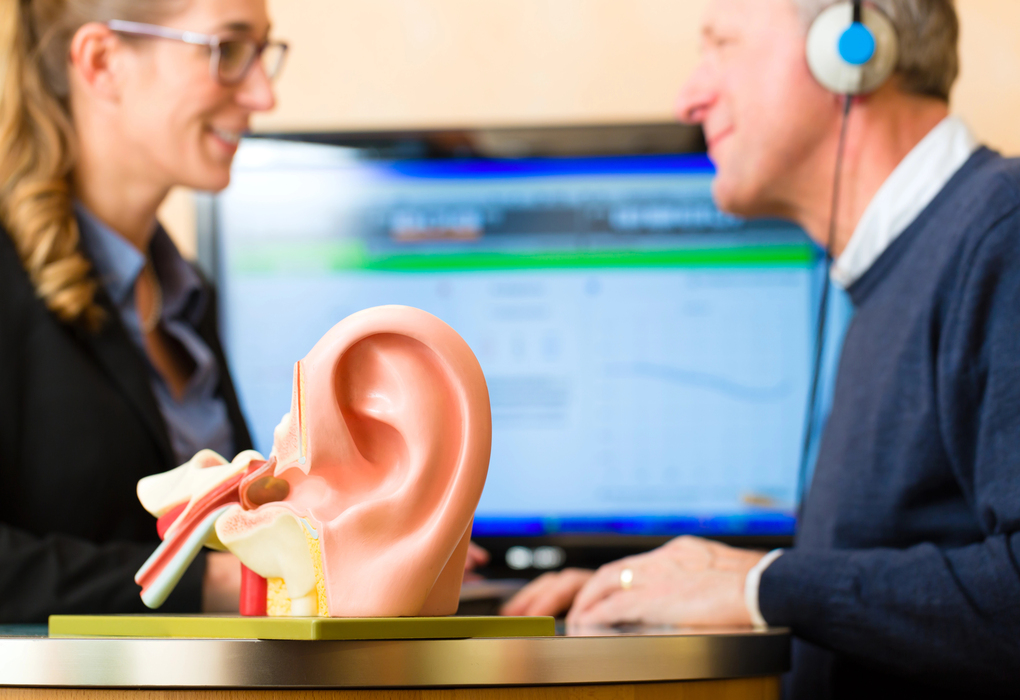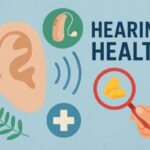Key Takeaways
- Tinnitus is not a disease but a symptom of an underlying condition, most commonly related to hearing damage, affecting millions of Americans.
- Common tinnitus sounds include ringing, buzzing, hissing, and clicking, with experiences varying widely between individuals.
- While there’s no universal cure for tinnitus, effective management strategies exist including hearing aids, sound therapy, and cognitive behavioral techniques.
- Stress and anxiety can significantly worsen tinnitus perception, creating a vicious cycle that requires comprehensive management approaches.
- Seeking professional evaluation from an audiologist is essential for proper diagnosis and personalized tinnitus management solutions.
That constant ringing in your ears isn’t just annoying—it’s telling you something important about your hearing health. As someone who’s evaluated thousands of patients with tinnitus, I understand how this mysterious symptom can disrupt your peace of mind and quality of life.
Tinnitus affects approximately 50 million Americans, making it one of the most common hearing-related complaints. Despite its prevalence, misconceptions about this condition abound, leaving many sufferers confused about what’s happening and what can be done. Clarity Hearing specialists help patients understand and manage their tinnitus symptoms through comprehensive evaluation and personalized treatment approaches.
Let’s dive into the most common questions about tinnitus to help you better understand this condition and discover effective strategies for relief.
What Exactly Is Tinnitus? Audiologist Explains That Ringing In Your Ears
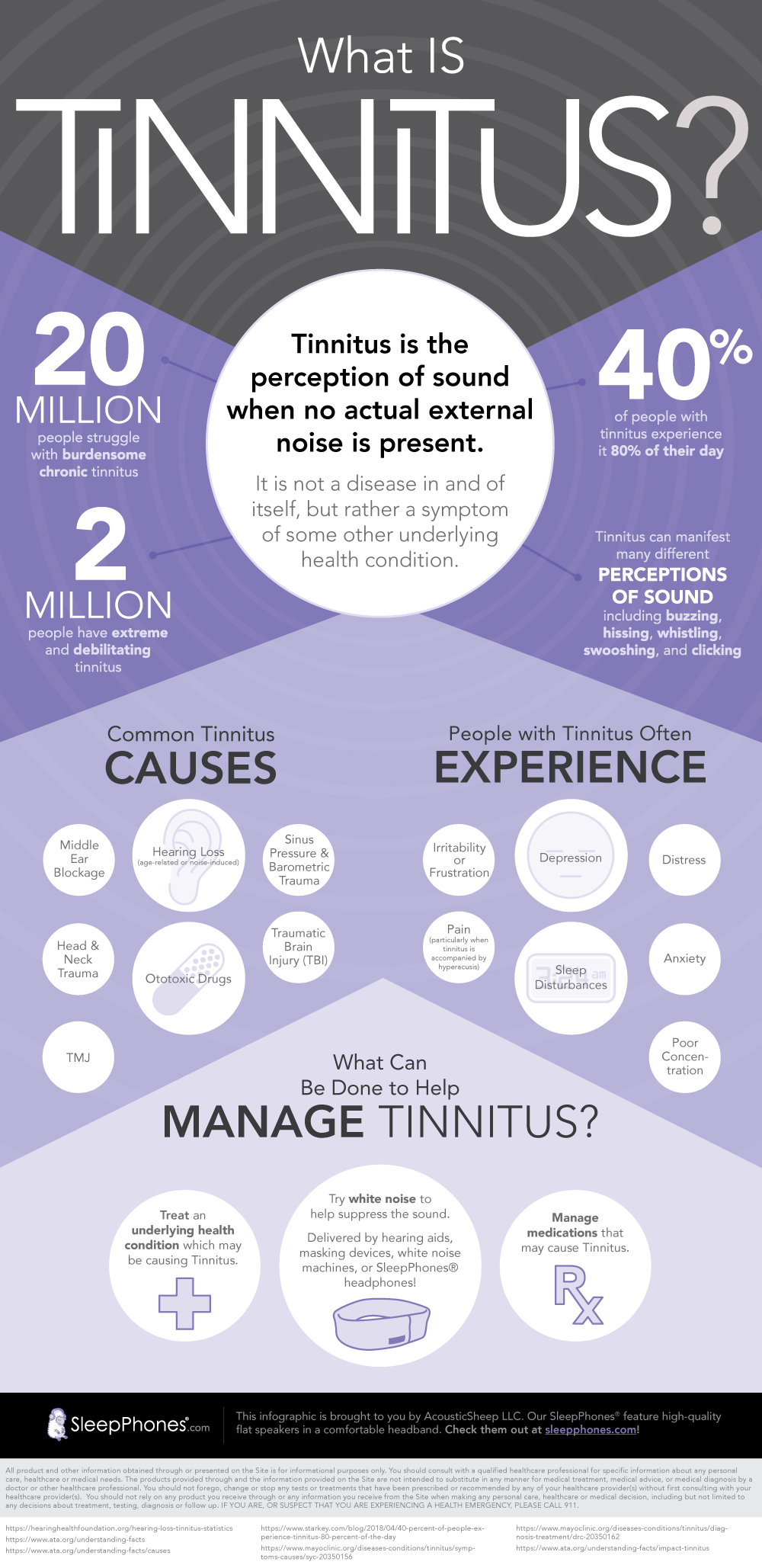
“What Is Tinnitus and How to Manage It” from www.sleepphones.com and used with no modifications.
Tinnitus is the perception of sound when no external sound is present. It’s important to understand that tinnitus itself is not a disease but rather a symptom of an underlying condition. Think of it as your ears’ way of signaling that something requires attention, similar to how pain alerts you to a potential problem in your body.
The sounds experienced can vary dramatically from person to person—from high-pitched ringing to low humming, from intermittent to constant. What makes tinnitus particularly challenging is that only the person experiencing it can hear these sounds, making it a deeply personal and sometimes isolating condition.
How Tinnitus Differs From Normal Hearing
Normal hearing involves sound waves traveling through your ear canal to the middle and inner ear, where they’re converted into electrical signals that your brain interprets as sound. Tinnitus, however, occurs when your auditory system generates signals even without external sound input. For those exploring natural remedies, some individuals find relief through herbal remedies for tinnitus.
This key difference explains why tinnitus can feel so perplexing. Your brain is receiving and processing sound signals, but these signals originate from within rather than from your environment. This internal generation of sound signals is what sets tinnitus apart from regular hearing and makes it uniquely challenging to address. To explore potential solutions, consider learning about the Sound Oasis Therapy Machine and its benefits for tinnitus.
Most people with normal hearing experience brief episodes of tinnitus occasionally, particularly after exposure to loud noise. However, when these sounds persist or recur frequently, they cross into the territory of problematic tinnitus that may require professional intervention.
Common Sounds People Experience Beyond Just “Ringing”
While tinnitus is often described as “ringing in the ears,” this simplification doesn’t capture the diverse range of sounds that people actually experience. The auditory manifestations of tinnitus can be remarkably varied.
Some describe their tinnitus as buzzing, whistling, or hissing, while others report clicking, roaring, or even musical sounds. Tinnitus sounds can be high or low pitched, soft or loud, constant or intermittent. This wide spectrum of experiences is why specialists avoid using just “ringing” to describe tinnitus in clinical settings. For those seeking relief, exploring options like the Sound Oasis Therapy Machine might be beneficial.
“Tinnitus is a blanket term for any sound that someone hears without an external source. It can be described as many things, the most common being ringing, but it can also be described as whooshing, roaring, crickets, clicking, or essentially any noise that somebody hears inside their head.”
The Difference Between Temporary and Chronic Tinnitus
Temporary tinnitus typically resolves within a few minutes to a few days. This type commonly occurs after exposure to loud noises like concerts or sporting events. As the auditory system recovers, these phantom sounds gradually fade away. If you’ve ever left a loud concert with ears ringing, only to wake up the next morning with normal hearing, you’ve experienced temporary tinnitus.
Chronic tinnitus, however, persists for months or years and often indicates more significant underlying issues. This persistent form tends to have a greater impact on quality of life, potentially affecting sleep, concentration, and emotional well-being. Understanding whether your tinnitus is temporary or chronic helps determine the appropriate approach to management and treatment.
The Science Behind Why Tinnitus Happens

“Does tinnitus go away?” from www.connecthearing.com.au and used with no modifications.
At its core, tinnitus results from abnormal neural activity in the auditory pathways. When the delicate hair cells in your inner ear become damaged or overstimulated, they can send random electrical impulses to your brain, which interprets these signals as sound. This neurophysiological explanation helps us understand why tinnitus isn’t “all in your head” but rather a real auditory phenomenon with physical causes.
Connection Between Hearing Loss and Tinnitus
Hearing loss and tinnitus frequently go hand-in-hand, with about 90% of tinnitus cases occurring alongside some degree of hearing loss. When hair cells in the cochlea become damaged, they not only lose their ability to transmit sound properly but may also begin generating inappropriate signals that manifest as tinnitus.
- Noise-induced hearing loss commonly triggers tinnitus as loud sounds damage inner ear structures
- Age-related hearing loss (presbycusis) often develops alongside tinnitus as hair cells deteriorate
- Hearing loss creates a “silence gap” that may cause the brain to compensate by generating phantom sounds
- Treating the underlying hearing loss with hearing aids often reduces tinnitus perception significantly
This strong connection explains why audiologists typically recommend hearing tests as the first step in tinnitus evaluation. Addressing the hearing loss component can substantially improve tinnitus symptoms for many patients.
How Noise Exposure Damages Inner Ear Hair Cells
Exposure to loud noise is one of the leading causes of tinnitus. When we’re exposed to sounds exceeding 85 decibels (about the level of heavy city traffic), the delicate hair cells in our inner ear can become damaged. These hair cells don’t regenerate in humans, making this damage permanent. For those seeking relief, comparing white noise machines can be a helpful option to manage symptoms.
The damage process is both mechanical and metabolic. Intense sound waves can physically bend and break the tiny hair-like projections on these cells. Additionally, loud noise exposure creates oxidative stress, producing free radicals that damage cellular structures. Even brief exposure to extremely loud sounds, like gunshots or explosions, can cause immediate hair cell damage and trigger tinnitus.
This is why hearing protection is crucial in noisy environments. Using proper hearing protection during concerts, when operating power tools, or in industrial settings can significantly reduce your risk of developing noise-induced tinnitus.
Age-Related Changes That Trigger Tinnitus
As we age, the natural deterioration of hair cells and auditory pathways can lead to age-related hearing loss (presbycusis) and associated tinnitus. Starting around age 60, many people begin to experience some degree of hearing loss, with tinnitus often following close behind.
The aging process affects not only the sensory cells but also the neural connections throughout the auditory system. Blood flow to the inner ear may decrease with age, and the central auditory processing centers in the brain undergo changes that can contribute to tinnitus perception. These natural aging processes explain why tinnitus becomes increasingly common in older adults.
Other Medical Conditions That Cause Tinnitus
Beyond hearing loss, numerous other medical conditions can trigger or worsen tinnitus. Temporomandibular joint (TMJ) disorders can cause tinnitus due to the proximity of the jaw joint to the ear structures. Cardiovascular issues like high blood pressure or atherosclerosis can create a pulsatile form of tinnitus where people hear their own heartbeat. Ménière’s disease, characterized by episodes of vertigo, hearing loss, and tinnitus, affects the inner ear’s fluid balance.
Certain medications, known as ototoxic drugs, can damage the inner ear and cause tinnitus as a side effect. Common culprits include some antibiotics, cancer medications, and high doses of aspirin or NSAIDs. Even something as simple as excessive earwax buildup can trigger temporary tinnitus by blocking the ear canal and creating pressure on the eardrum.
Surprising Tinnitus Triggers You Should Know About
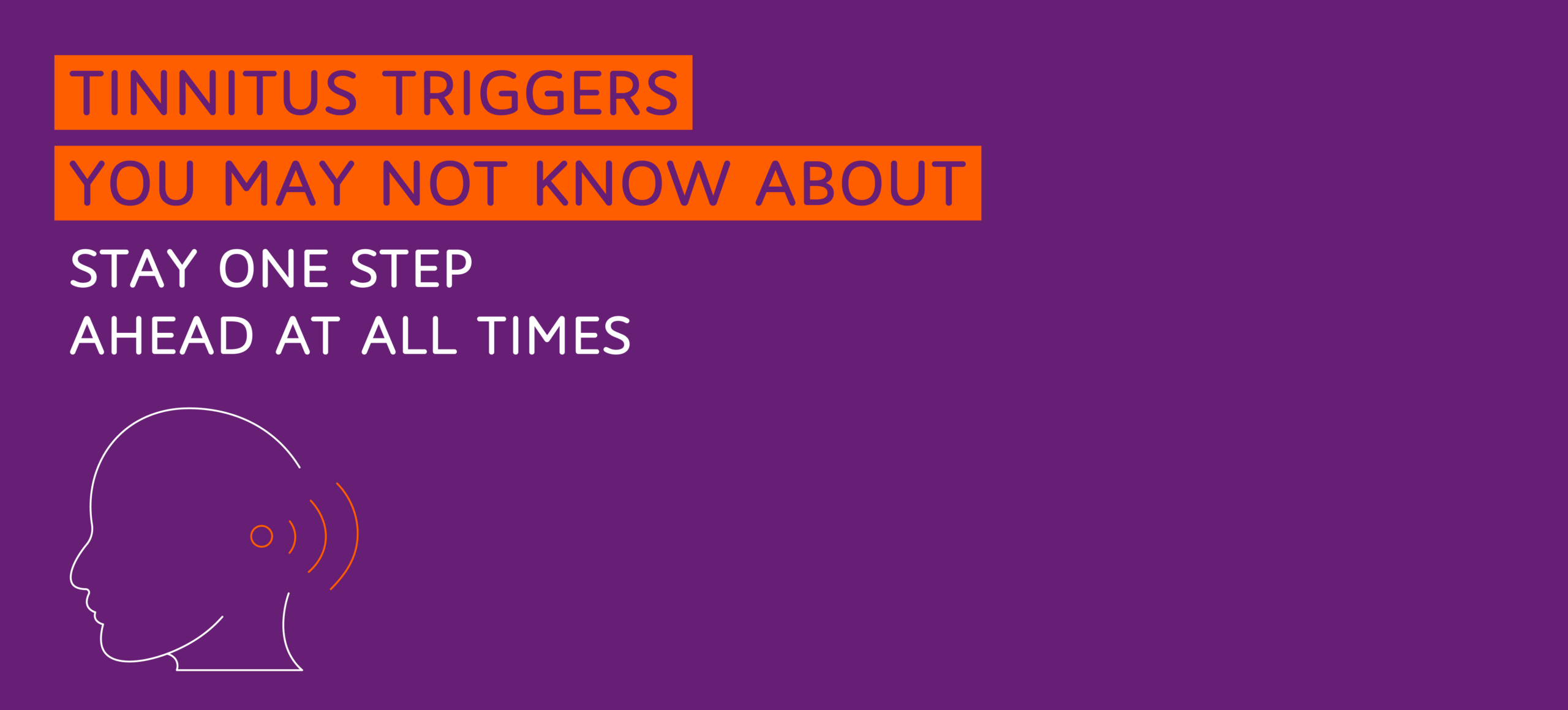
“Tinnitus Triggers You May Not Know …” from www.sukoon.com and used with no modifications.
Beyond the well-known causes, several surprising factors can trigger or exacerbate tinnitus. Many patients are unaware that their lifestyle choices may be contributing to their symptoms. Identifying these hidden triggers is often a crucial step in managing tinnitus effectively.
Seemingly unrelated habits like caffeine consumption, lack of sleep, or even certain physical activities can influence tinnitus perception. By tracking these factors in relation to your tinnitus symptoms, you may discover personal triggers that can be modified to improve your condition.
Medications That Can Make Tinnitus Worse
Several common medications have been linked to tinnitus as a potential side effect. Over 200 prescription and over-the-counter drugs list tinnitus as a possible adverse reaction. High doses of aspirin (more than 12 per day) can cause temporary tinnitus that resolves when the medication is discontinued.
Certain antibiotics, particularly aminoglycosides like gentamicin, can damage the inner ear and cause permanent tinnitus. Some chemotherapy drugs, particularly platinum-based compounds like cisplatin, are known to cause hearing damage and tinnitus. Even common medications like non-steroidal anti-inflammatory drugs (NSAIDs), diuretics, and some antidepressants can trigger or worsen tinnitus in susceptible individuals.
Never stop taking prescribed medication without consulting your healthcare provider, but do discuss any tinnitus symptoms with them. Often, alternative medications with similar benefits but fewer auditory side effects may be available.
How Stress and Anxiety Amplify Tinnitus Perception
The relationship between stress, anxiety, and tinnitus creates a challenging cycle for many patients. Stress doesn’t directly cause tinnitus, but it significantly amplifies our perception of and reaction to these sounds. When we’re stressed, our bodies remain in a heightened state of alertness, making us more aware of sensory input including tinnitus.
This increased awareness often leads to greater distress about the tinnitus, which in turn creates more stress, forming a self-perpetuating cycle. Many patients report that their tinnitus seems loudest during particularly stressful periods or when trying to fall asleep at night when external distractions are minimal. Research shows that those with higher stress levels and anxiety disorders tend to report more severe tinnitus symptoms, even when the objective characteristics of their tinnitus remain unchanged. For those seeking relief, exploring options like the Sound Oasis Therapy Machine may be beneficial.
Dietary Factors That May Influence Tinnitus
While scientific evidence remains limited, many tinnitus sufferers report that certain dietary choices affect their symptoms. Caffeine, alcohol, and high-sodium foods are commonly cited as potential tinnitus triggers. Some individuals find that reducing consumption of these substances leads to noticeable improvements in their tinnitus perception.
The mechanism behind these dietary influences may relate to how these substances affect blood flow and nerve activity in the auditory system. Caffeine can increase neural activity and constrict blood vessels, potentially intensifying tinnitus. Alcohol can temporarily alter fluid balance in the inner ear and affect neurotransmitter function. High sodium intake may disrupt inner ear fluid balance, particularly in people with Ménière’s disease or similar conditions.
Is There Actually a Cure for Tinnitus
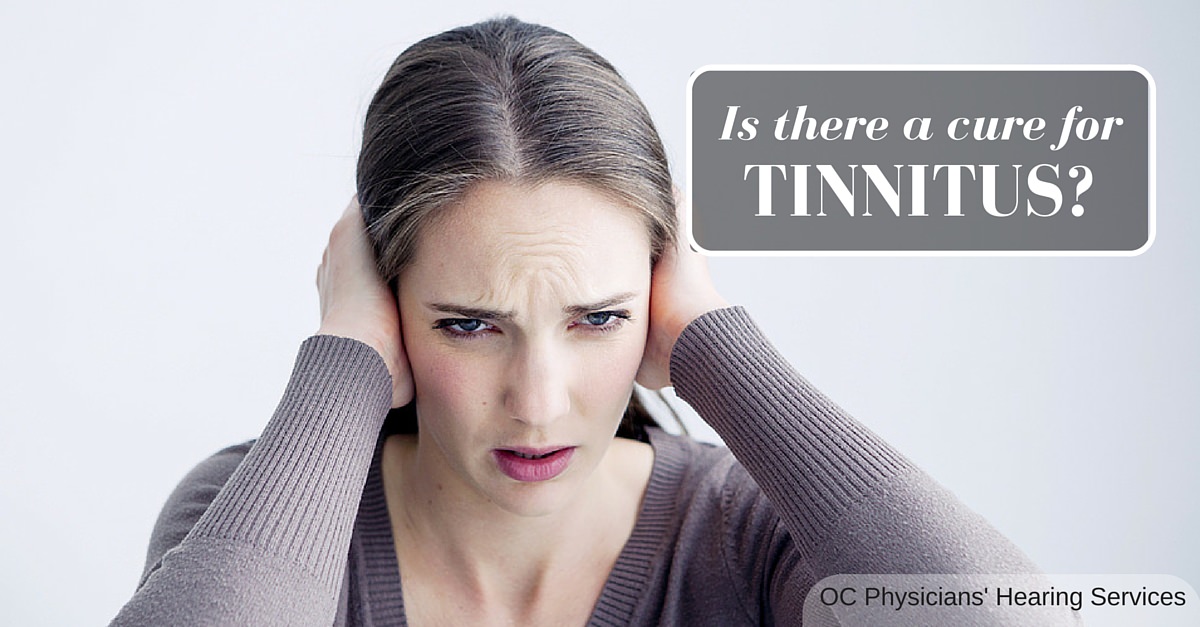
“Is There a Cure for Tinnitus?” from physicianshearingservices.com and used with no modifications.
?
The question patients ask most frequently is whether tinnitus can be cured. The honest answer is that currently, there is no universal cure for all forms of tinnitus. However, this doesn’t mean that nothing can be done. For specific types of tinnitus with identifiable physical causes—such as tinnitus resulting from earwax blockage or certain vascular abnormalities—addressing these underlying issues can potentially eliminate the tinnitus completely.
|
Type of Tinnitus |
Potential for Complete Resolution |
Common Management Approaches |
|---|---|---|
|
Caused by earwax impaction |
High – often completely resolvable |
Professional earwax removal |
|
Medication-induced |
Moderate to high – may resolve when medication is changed |
Medication adjustment under medical supervision |
|
Noise-induced |
Low – typically requires ongoing management |
Hearing aids, sound therapy, habituation techniques |
|
Age-related |
Low – typically requires ongoing management |
Hearing aids, sound therapy, habituation techniques |
|
Ménière’s disease related |
Variable – may improve with disease management |
Medical management of Ménière’s disease, lifestyle modifications |
For the majority of tinnitus cases, particularly those resulting from sensorineural hearing loss, complete elimination may not be possible with current medical technology. However, this doesn’t mean you must simply “learn to live with it.” Numerous effective management strategies can significantly reduce tinnitus impact on your quality of life.
The goal of modern tinnitus management isn’t necessarily to eliminate the sound entirely, but rather to reduce your awareness of it and minimize its interference with daily activities, sleep, and emotional well-being. Many patients achieve substantial relief through comprehensive management approaches, even when the tinnitus itself persists at some level.
Why Many “Miracle Cures” Fall Short
The internet is filled with “miracle cures” for tinnitus, from herbal supplements to special diets and devices claiming to eliminate tinnitus completely. These products often prey on the desperation of tinnitus sufferers seeking relief. Most lack scientific evidence supporting their effectiveness and may waste valuable time and money that could be better spent on evidence-based approaches.
The reality is that if there were a simple pill or device that reliably cured all forms of tinnitus, it would be widely adopted by medical professionals worldwide. The complexity and individual nature of tinnitus means that what works for one person may not work for another. This is why personalized assessment and treatment planning with qualified hearing healthcare providers is so important.
When evaluating potential tinnitus treatments, always look for peer-reviewed research supporting their effectiveness and discuss options with healthcare professionals trained in tinnitus management before investing in unproven remedies.
The Difference Between Treatment and Management
Understanding the distinction between “treating” and “managing” tinnitus helps set realistic expectations. Treatment implies addressing the underlying cause to eliminate the symptom completely. Management, however, focuses on reducing tinnitus impact on your quality of life, even if the sound itself persists at some level.
For most forms of chronic tinnitus, management strategies offer the most effective path to relief. These approaches don’t promise to eliminate tinnitus entirely but rather aim to reduce its negative effects on your daily life. Many patients who accept this management perspective actually experience significant reduction in tinnitus distress and find that, over time, they become much less aware of their tinnitus.
This shift in perspective—from seeking a “cure” to implementing effective management strategies—often marks a turning point in successful tinnitus care. By focusing on practical steps to reduce tinnitus impact rather than eliminating it completely, patients typically experience greater satisfaction with their outcomes.
5 Proven Strategies to Manage Tinnitus Effectively
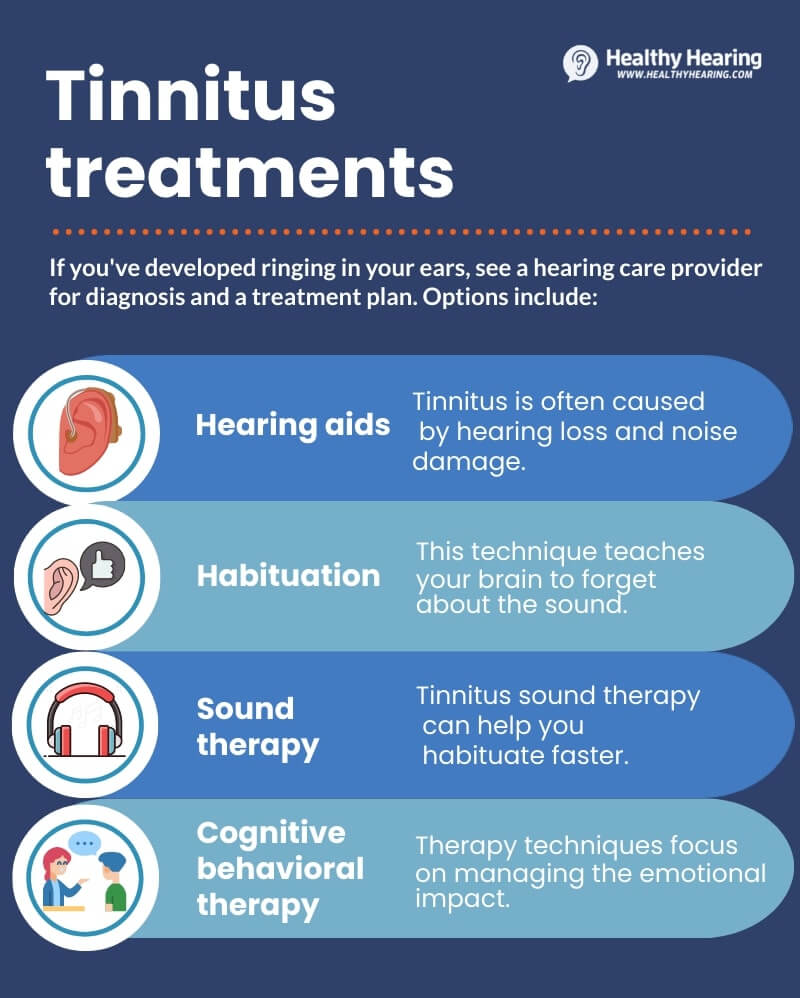
“Top treatments and remedies for ear ringing” from www.healthyhearing.com and used with no modifications.
While there’s no single solution that works for everyone with tinnitus, several evidence-based approaches have helped countless patients reduce their tinnitus distress. These strategies often work best when combined in a comprehensive management plan tailored to your specific situation. The goal isn’t just to address the sound itself but to reduce its impact on your quality of life.
Most tinnitus management plans incorporate multiple approaches simultaneously, targeting different aspects of the condition. This multi-faceted strategy recognizes that tinnitus affects people physically, emotionally, and psychologically. Let’s explore the most effective options backed by scientific research and clinical experience.
1. Hearing Aids and How They Help Mask Tinnitus
For the majority of tinnitus sufferers who also have hearing loss, properly fitted hearing aids often provide significant relief. By amplifying environmental sounds, hearing aids help mask tinnitus and redirect attention away from the internal sound. Modern hearing aids can also include specialized tinnitus masking features that generate pleasant background sounds precisely calibrated to your specific tinnitus frequency. For more information, you can explore Sound Oasis therapy machines that offer additional relief options.
Many patients report that their tinnitus seems less noticeable or even disappears completely when wearing their hearing aids. This effect occurs because hearing aids address the “silence gap” that often makes tinnitus more noticeable. By improving overall hearing function, these devices help reintroduce environmental sounds that naturally mask tinnitus and reduce the contrast between tinnitus and background silence. For additional support, some patients explore options like the Sound Oasis Therapy Machine to further alleviate symptoms.
Today’s advanced hearing aid technology offers unprecedented opportunities for tinnitus relief. Features like Bluetooth connectivity allow streaming of customized sound therapy directly to your ears throughout the day. Some devices even allow audiologists to program specific tinnitus masking sounds tailored to your particular tinnitus pitch and quality.
2. Sound Therapy Techniques for Tinnitus Relief
Sound therapy uses external noise to alter tinnitus perception or distract attention from it. This approach can be delivered through specialized devices or simple household items like fans or sound machines. For example, the Sound Oasis therapy machine offers a range of sound options specifically designed for tinnitus relief. The concept is straightforward: introducing pleasant or neutral background sounds reduces the perceived contrast between tinnitus and silence, making the tinnitus less noticeable.
Several forms of sound therapy have proven effective for tinnitus management. White noise provides a constant, unchanging background sound that masks tinnitus. Nature sounds like rainfall or ocean waves offer more pleasant alternatives with similar benefits. Notched music therapy filters out frequencies matching your tinnitus pitch, potentially helping your brain learn to ignore those frequencies over time.
Many patients find that sound therapy is particularly helpful during quiet times when tinnitus tends to be most noticeable, especially when trying to fall asleep. Simple solutions like bedside sound machines or smartphone apps with various soundscapes can make a significant difference in sleep quality for tinnitus sufferers.
3. Cognitive Behavioral Therapy Approaches
Cognitive Behavioral Therapy (CBT) addresses the emotional and psychological impacts of tinnitus rather than the sound itself. This approach helps change negative thought patterns about tinnitus and develop healthier responses to the symptom. Research consistently shows that CBT reduces tinnitus-related distress, improves sleep, and enhances quality of life, even when the actual tinnitus sound remains unchanged.
Working with a therapist trained in CBT for tinnitus, patients learn to identify and challenge unhelpful thoughts about their condition. For example, catastrophic thinking like “my tinnitus will never improve” or “I can’t live with this sound” can be replaced with more balanced perspectives. Patients also develop practical coping strategies and relaxation techniques to reduce tinnitus-related stress. For more information on tinnitus and its treatments, visit Clarity Hearing.
Many audiologists now partner with mental health professionals to provide this important component of tinnitus management, recognizing that addressing the psychological aspects of tinnitus is just as important as its audiological dimensions.
4. Relaxation and Stress Management Methods
Since stress often exacerbates tinnitus perception, stress management techniques can be particularly effective for many patients. Regular practice of relaxation methods can help break the vicious cycle where tinnitus causes stress, which in turn makes tinnitus seem louder. These approaches include progressive muscle relaxation, deep breathing exercises, mindfulness meditation, and yoga.
Mindfulness meditation has gained significant attention in tinnitus research, with studies showing it can help patients develop a different relationship with their tinnitus. Rather than fighting against or trying to eliminate the sound, mindfulness encourages accepting its presence without judgment while focusing attention elsewhere. This acceptance paradoxically tends to reduce tinnitus distress and intrusiveness.
- Progressive muscle relaxation reduces physical tension associated with tinnitus stress
- Deep breathing exercises activate the parasympathetic nervous system, reducing stress response
- Mindfulness meditation helps develop healthier attention patterns away from tinnitus
- Regular physical activity releases tension and improves overall stress resilience
5. Lifestyle Modifications That Reduce Tinnitus Impact
Several lifestyle factors can significantly influence tinnitus perception and should be addressed as part of a comprehensive management plan. Limiting exposure to loud noise prevents further hearing damage that could worsen tinnitus. Moderating consumption of potential triggers like caffeine, alcohol, and high-sodium foods may benefit some individuals, though responses vary between patients.
Maintaining consistent sleep patterns helps prevent the exhaustion that often makes tinnitus more noticeable. Creating a quiet but not silent sleeping environment—often using gentle background sounds—can make falling asleep easier. Regular physical exercise improves overall well-being and stress resilience, indirectly benefiting tinnitus management.
Many patients find that keeping their minds engaged in absorbing activities naturally shifts attention away from tinnitus. Pursuing hobbies, social connections, and meaningful work provides natural “distraction therapy” that makes tinnitus less prominent in daily awareness.
When Tinnitus Demands Immediate Medical Attention
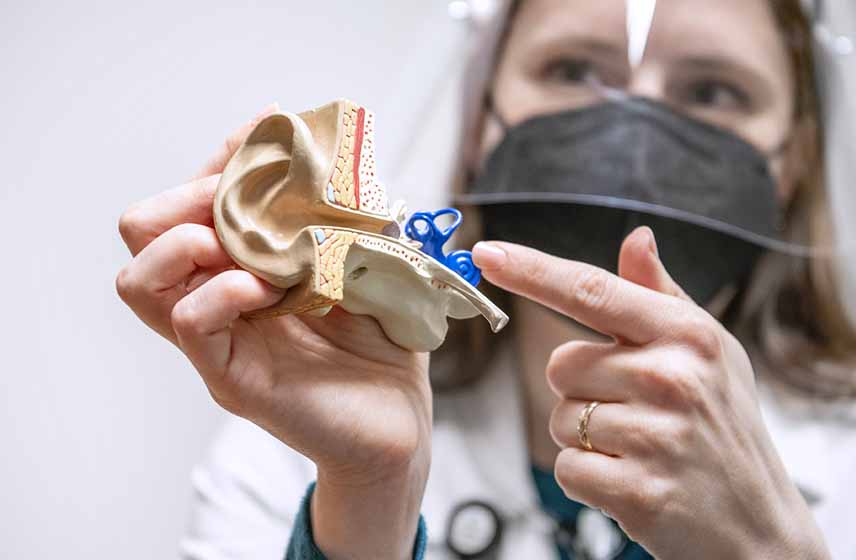
“Get Tinnitus Treatment | Cleveland Clinic” from my.clevelandclinic.org and used with no modifications.
While most tinnitus cases develop gradually and don’t represent medical emergencies, certain presentations warrant immediate medical evaluation. Understanding these red flags helps ensure that potentially serious underlying conditions aren’t overlooked. Prompt medical attention in these situations can sometimes prevent permanent hearing damage or address other significant health concerns.
Red Flags That Require an ENT Referral
Certain tinnitus characteristics should prompt immediate consultation with an otolaryngologist (ENT physician). Pulsatile tinnitus—where the sound pulses in rhythm with your heartbeat—may indicate vascular abnormalities that require medical evaluation. Unilateral tinnitus that affects only one ear, especially when accompanied by asymmetric hearing loss, should be investigated promptly as it occasionally signals acoustic neuroma or other growths.
If your tinnitus is accompanied by severe dizziness, vertigo, or balance problems, this combination may indicate inner ear disorders requiring specific treatment. Tinnitus that develops suddenly after head trauma needs medical assessment to rule out temporal bone fractures or other injuries. Additionally, any tinnitus accompanied by significant pain, drainage from the ear, or rapidly progressing hearing loss constitutes a medical emergency requiring immediate care.
Remember that something else to note is that most of the time, tinnitus occurs in both ears. If you are noticing it in just one ear, seeing an ear, nose, and throat physician promptly is recommended to rule out anything serious.
The Connection Between Sudden Hearing Loss and Tinnitus
Sudden sensorineural hearing loss (SSHL)—defined as a rapid loss of hearing typically occurring over 72 hours or less—is a medical emergency that often comes with tinnitus. This condition requires immediate medical treatment, usually with corticosteroids, to maximize chances of hearing recovery. The window for effective intervention is narrow, typically within the first 2-4 weeks, with earlier treatment yielding better outcomes.
Tinnitus often serves as the first noticeable symptom of SSHL, as patients may attribute hearing difficulties to environmental factors but can’t ignore the new internal sound. If you experience sudden onset of tinnitus, especially if accompanied by a sensation of fullness in the ear or muffled hearing, seek emergency medical care immediately—don’t wait for your next available appointment.
Unfortunately, many patients delay seeking treatment for sudden hearing loss, reducing their chances of full recovery. Understanding the urgency of this condition can make the difference between temporary and permanent hearing damage.
Next Steps: Getting Professional Help for Your Tinnitus
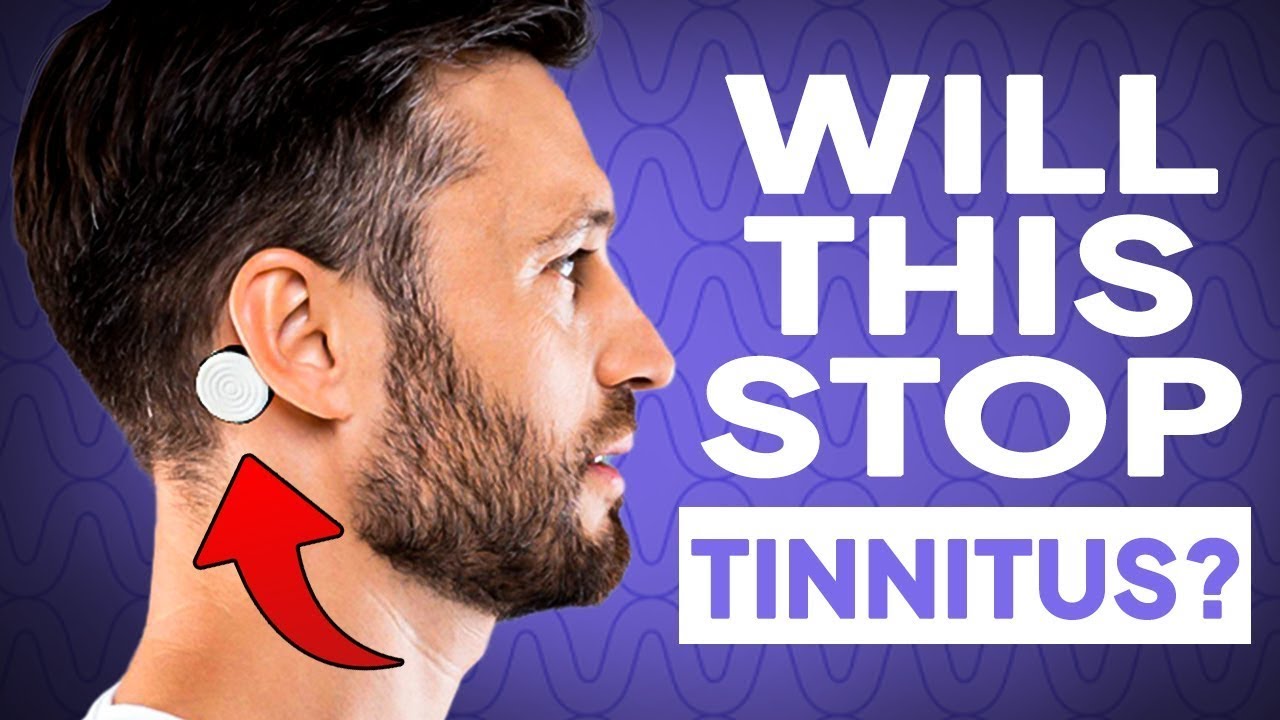
“New Tinnitus Blocker – Reviewed – YouTube” from www.youtube.com and used with no modifications.
If you’re experiencing persistent tinnitus, the most important first step is a comprehensive evaluation by a qualified healthcare provider. Audiologists specializing in tinnitus management can provide thorough assessment and personalized treatment recommendations. Many patients find significant relief once they understand their condition and have a concrete plan for managing it.
Don’t hesitate to seek professional help for tinnitus, especially if it’s affecting your quality of life, sleep, or emotional well-being. The sooner you begin appropriate management strategies, the better your outcomes are likely to be. Remember that you don’t have to face tinnitus alone—qualified professionals can help guide you toward effective solutions.
What to Expect During a Tinnitus Assessment
A comprehensive tinnitus evaluation typically includes several components designed to understand your specific experience and identify underlying causes. Your audiologist will begin with a detailed case history, discussing when your tinnitus started, what it sounds like, how often it occurs, and how it affects your daily life. This history helps establish potential triggers and guides the physical examination. For more insights on managing tinnitus, you might consider exploring pine bark extract for tinnitus as a potential supplement.
The audiological assessment includes comprehensive hearing testing to identify any hearing loss that may be contributing to your tinnitus. Specialized tinnitus matching tests may be performed to determine the pitch and loudness of your tinnitus, which helps in developing targeted management strategies. Your provider will also conduct a thorough physical examination of your ears to check for issues like earwax impaction or signs of infection. For those exploring additional options, understanding the efficacy of the Lenire device can be beneficial in managing tinnitus symptoms.
Based on these findings, your audiologist will determine whether additional medical referrals are needed and begin developing a personalized tinnitus management plan. This collaborative process considers your specific tinnitus characteristics, hearing status, lifestyle factors, and personal preferences to create the most effective approach for your situation. For more insights, you can explore Lenire device efficacy and its role in tinnitus management.
Questions to Ask Your Audiologist
Preparing questions before your appointment helps ensure you get the information you need to understand and manage your tinnitus effectively. Ask about the probable cause of your tinnitus and whether any underlying medical conditions need to be addressed. Discuss what treatment options are most appropriate for your specific type of tinnitus and what results you can realistically expect from these interventions.
Inquire about lifestyle modifications that might help reduce your tinnitus symptoms and whether you should consider hearing aids or other assistive devices. Ask about resources for coping with the emotional aspects of tinnitus, including support groups or counseling options. Finally, establish a clear follow-up plan, including how to monitor your progress and when to schedule your next appointment.
Don’t hesitate to take notes or bring a friend or family member to help remember important information. The more engaged you are in the process, the more successful your tinnitus management is likely to be.
Frequently Asked Questions
After years of working with tinnitus patients, I’ve found certain questions arise consistently. These common concerns reflect the natural uncertainty many people feel when dealing with this complex symptom. Addressing these questions directly can help clarify misconceptions and provide practical guidance for those experiencing tinnitus.
Can children get tinnitus or is it only an adult condition?
Children absolutely can experience tinnitus, though they may describe or react to it differently than adults. Research suggests that up to 40% of children with hearing loss report tinnitus symptoms. However, children are less likely to spontaneously report tinnitus unless directly questioned, often because they assume everyone hears these sounds or lack the vocabulary to describe their experience. For those interested in alternative approaches, exploring herbal remedies for tinnitus might provide some insights.
Childhood tinnitus deserves the same comprehensive evaluation as adult cases, including hearing assessment and potential medical referrals when appropriate. The good news is that children often adapt to tinnitus more readily than adults, particularly when provided with appropriate support and reassurance. If your child complains of sounds in their ears, a pediatric audiologist evaluation is recommended to assess hearing status and provide appropriate management strategies.
Will my tinnitus ever completely go away on its own?
Temporary tinnitus, such as that following noise exposure or an ear infection, often resolves spontaneously as the underlying cause heals. However, tinnitus that has persisted beyond several weeks becomes less likely to disappear entirely on its own. That said, the brain’s natural habituation process means that many people find their awareness of and distress from tinnitus diminishes over time, even without formal treatment. For those seeking natural remedies, exploring herbal teas for tinnitus relief might be beneficial.
Research indicates that approximately 15-20% of people with chronic tinnitus experience spontaneous resolution, though predicting who will fall into this fortunate group remains difficult. Rather than waiting indefinitely for tinnitus to disappear, most hearing healthcare professionals recommend implementing evidence-based management strategies to reduce its impact on your quality of life. These approaches often accelerate the natural habituation process and provide relief while waiting to see if your tinnitus resolves completely.
Does wearing earplugs make tinnitus better or worse?
Appropriate use of hearing protection in genuinely loud environments (above 85 decibels) is essential for preventing further hearing damage that could worsen tinnitus. However, overuse of earplugs in normal or quiet environments can actually exacerbate tinnitus by creating an artificially silent environment where tinnitus becomes more noticeable and by potentially increasing auditory sensitivity.
The best approach is targeted protection: use properly fitted hearing protection in truly noisy situations while allowing your ears normal exposure to everyday sounds at safe levels. For musicians or others regularly exposed to loud sounds, consider custom-molded musicians’ earplugs that reduce volume evenly across frequencies without muffling sound quality. If you’re uncertain about appropriate hearing protection strategies for your specific situation, consult an audiologist for personalized recommendations.
Can alternative therapies like acupuncture help with tinnitus?
Research on alternative therapies for tinnitus shows mixed results, with some patients reporting benefits while scientific studies often show limited statistical evidence of effectiveness beyond placebo effects. Acupuncture has been studied more extensively than many other alternative approaches, with some research suggesting it may help certain patients, particularly those whose tinnitus is related to muscle tension or blood flow issues.
Other alternative approaches like ginkgo biloba, zinc supplements, and hypnotherapy have inconsistent evidence supporting their effectiveness for tinnitus. However, if you’re interested in exploring these options as complementary approaches to conventional tinnitus management, discuss them with your healthcare providers to ensure they won’t interfere with other treatments or medical conditions. For more information, you can read about what is tinnitus and is it treatable.
The most important consideration when exploring alternative therapies is to maintain realistic expectations and continue with evidence-based approaches simultaneously. Alternative treatments are best viewed as potential complements to, rather than replacements for, established tinnitus management strategies.
Is tinnitus hereditary or can it run in families?
While tinnitus itself is not directly inherited as a single genetic trait, the predisposition to developing tinnitus does appear to have hereditary components. Several studies have found that tinnitus tends to cluster in families, suggesting genetic factors may influence susceptibility. However, this familial pattern likely reflects inheritance of related conditions—such as susceptibility to hearing loss or certain cardiovascular disorders—rather than tinnitus itself.
Research in this area continues to evolve, with several ongoing studies examining specific genetic markers that may correlate with tinnitus risk. Understanding these genetic factors could eventually lead to more personalized approaches to prevention and treatment. For now, if you have a family history of tinnitus or hearing loss, it’s particularly important to practice good hearing conservation and seek prompt evaluation for any auditory symptoms. Additionally, exploring herbal remedies for tinnitus might offer some relief and complement traditional approaches.
While you can’t change your genetic makeup, awareness of family history empowers you to take proactive steps toward protecting your hearing health and addressing tinnitus symptoms early if they develop.
